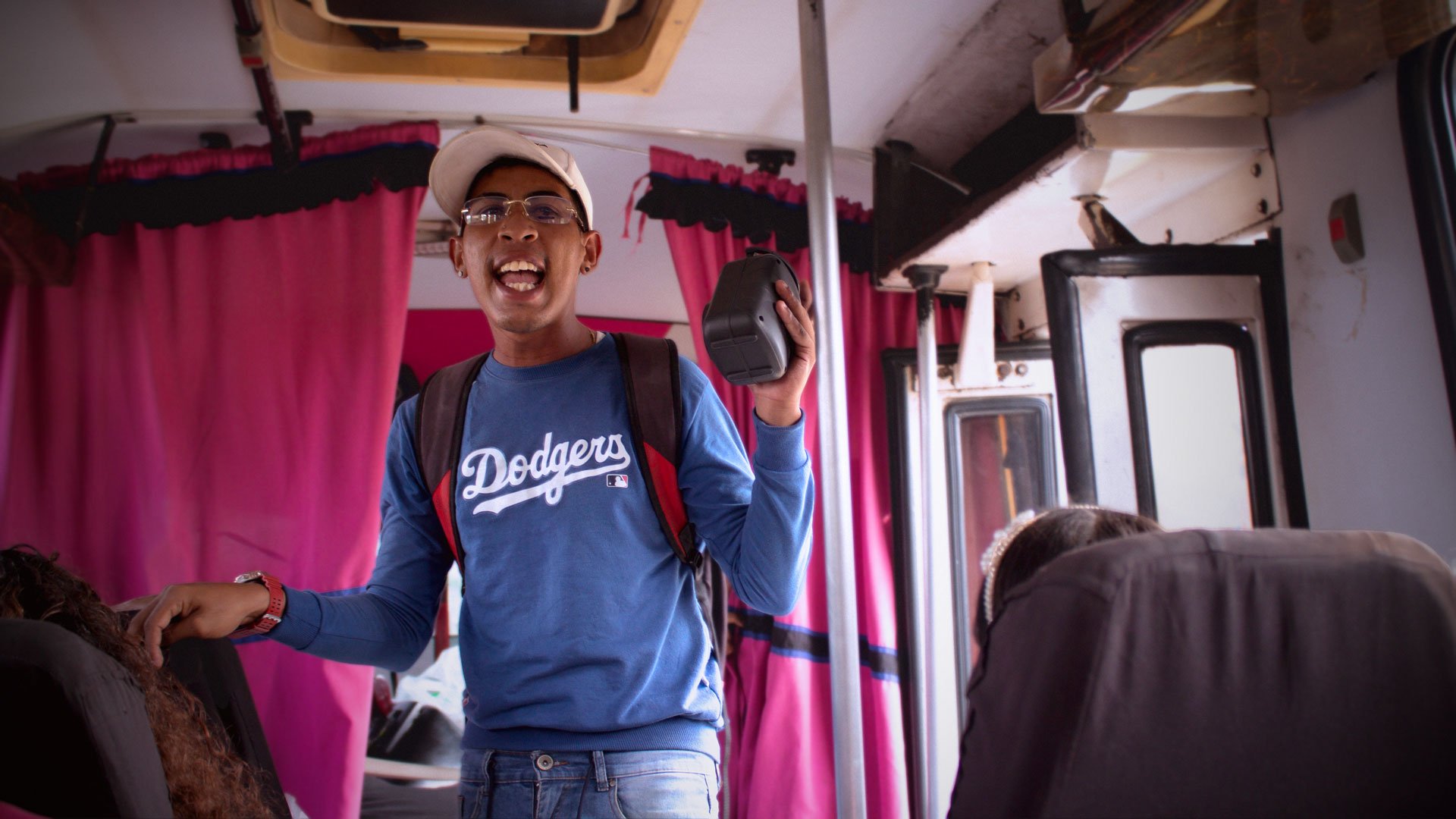


San Francisco de Yare, a semi-rural city just over an hour from Caracas, is one of five in the Valles del Tuy region. Every year, hundreds of tourists visit the place on the Feast of Corpus Christi to watch the ritual dance of the Diablos Danzantes de Yare [The Dancing Devils of Yare], the largest and oldest confraternity in Venezuela. Once it is over, the town gradually empties out into oblivion for most people, but not for Emmanuel Graterol.
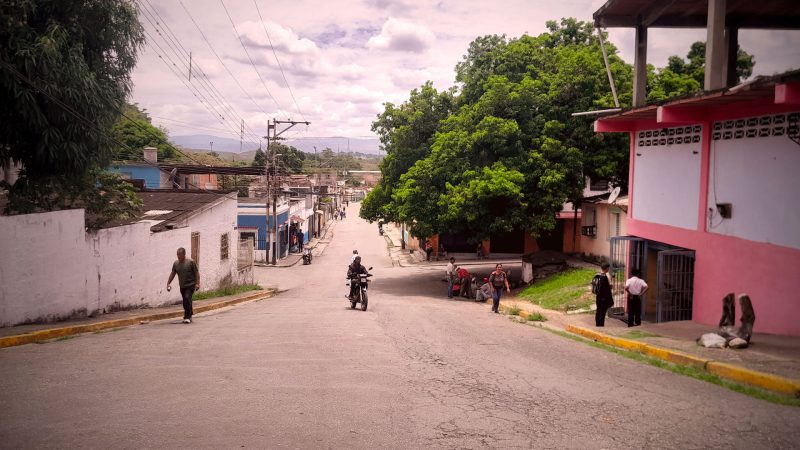 PHOTOS: VICTORY ABI
PHOTOS: VICTORY ABIPregnancy is seldom in your plans when you are just seventeen. At that age, it is more something that happens and that you have to deal with one way or another, but it is not that you were consciously trying. That was the case for Emmanuel Graterol. It caught him by surprise, but that did not mean he would not love his child.
The anticipation of becoming parents was greater than their fear. They were both anxious, of course, but it was not a challenge they could not face. They called him Misael, and they watched him grow month by month, floating in amniotic fluid. Their love for their child would grow as much between ob-gyn checkups and family celebrations.
Everything was going well, until one day it wasn’t.
At a prenatal care visit, during a routine ultrasound, the doctor noticed something unusual in the blurry images on the machine screen. The baby appeared to be well formed: his arms, legs, everything was where and as it should be; however, his head was smaller than expected relative to his body.
The doctor frowned and zoomed in on the image, scanning the mom’s belly with the transducer, as if hoping for a different result. But his diagnostic impression was correct: Misael would be born with microcephaly, a congenital defect that is usually detected at weeks 20 to 28 of pregnancy.
By that time, with only two to three months to go before the baby is born, you have already gotten used to the idea that you will have a child, and you will have made arrangements in your house, your schedule, and your life to welcome him into your world.
—“In your case, I would recommend a medical abortion,” said the doctor. “The baby will most likely die shortly after birth.”
Now they were the ones frowning, struggling to hold back tears.
The doctor insisted, but they decided otherwise. After all, their baby was already a presence in their lives and they were not going to give up on him that easily.
Emmanuel is now twenty-six. He is an actor, a singer, and a merchant. Every week, he takes a bus and a train to go to Caracas, where he works as an actor in a web series and sells clothes in a local marketplace, and then back to Yare, where he belongs.
He always goes back to Yare.
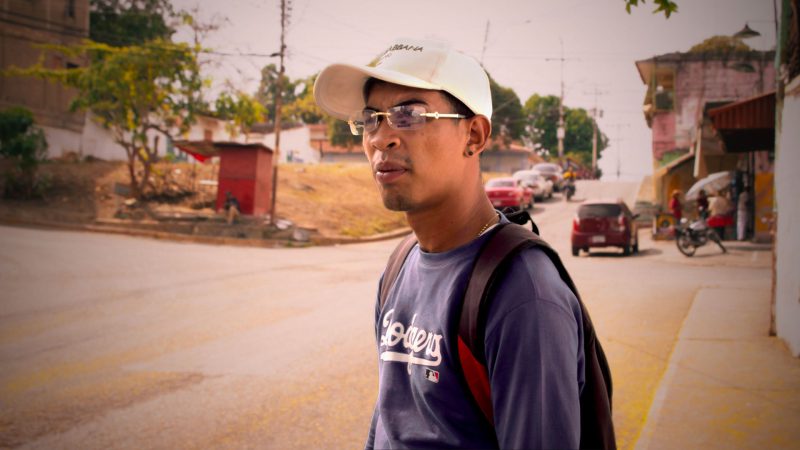
San Francisco de Yare, one of five cities that make up the Valles del Tuy region, is located about 46.6 miles south of Caracas. It is mostly known as the site of the Yare Penitentiary Center and as the home to the Dancing Devils of Yare. The confraternity of the Dancing Devils of Yare is the largest and oldest in Venezuela, with more than 2,500 promeseros [those who make vows or promises to the Blessed Sacrament]. San Francisco de Yare is a small, semi-rural area that has tried to make its way towards industrialization but remains largely agricultural.
In each of his trips to and from Caracas, Emmanuel sings. It was at around the same time he learned that Misael was on his way that he wrote his first rap song. He was seventeen.
In every twist and turn that his life has gone, and there have been plenty, his songs have played as a musical background and as a means to both make himself understood and make sense of who he is.
When he was twenty-two and Misael was five, having changed jobs numerous times, and with some of his teenage yearnings still unresolved and a strong desire to do something he really liked, he hopped on a bus in Yare and sang his songs in public for the first time.
Ángelo Darío, a former schoolmate who is also a rapper, gave him that little extra push he needed, for he was like in a limbo, not knowing what to do.
—“Are you currently rapping?” asked Ángelo.
—“No, I am not.”
—”How come, dude?”
—“I hadn’t occurred to me.”
—“I’m rapping here on the buses. I’m doing great.”
—“Really? Do people respond well?”
—“Of course they do! I’ll come for you tomorrow first thing in the morning to show you.”
And he kept to his word. At 6:00 a.m., Ángelo was knocking on Emmanuel’s door.
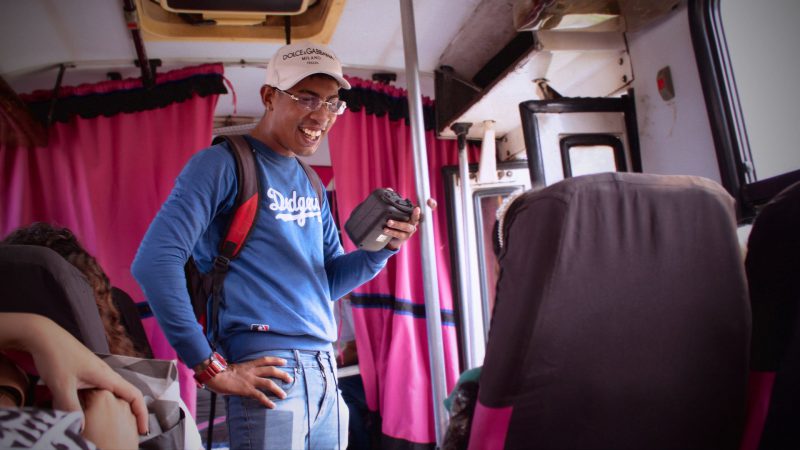
There are various music distribution formats, and each one dictates the duration of an artist’s songs. For example, the first vinyl records only allowed for about three minutes of audio per side because of their limited size. That physical restriction imposed an average length for songs that is still in force today, even though no one uses those old records anymore.
The ‘on-the-bus’ music genre has its own restrictions too. Emmanuel would find out about it during his first bus rapping sessions with Ángelo: the distance between a bus stop and the next is the key factor. So, he taught himself to adapt his songwriting style to his new distribution format.
He went from singing on buses to singing on gigs, concerts, and parties, in a minute.
But he would always go back to Yare.
To the buses of Yare.
Yet, for one week each year, things change for Emmanuel, because he is one of the promeseros of the confraternity of the Dancing Devils of Yare on Corpus Christi. The religious feast, which honors the Blessed Sacrament of the Altar, is held strictly on the Thursday after Trinity Sunday, although in Yare it goes on a little longer.
For an entire week prior, the promeseros stay home preparing for the ritual dance.
And on the streets and in the media, things stretch longer than that. For thirty days or so, radio stations recall historical data and praise legendary promeseros and devoted exponents of the tradition, and the walls of Yare fill with color, which the scorching sun will wash out in a few months and will have to be reapplied for the following year’s feast.
Every Thursday on Corpus Christi, Emmanuel leaves home dressed in red, wearing alpargatas, and carrying maracas. His mask, bigger than his face, has a large red cloth around it. When he puts it on, he is just another member of the confraternity.
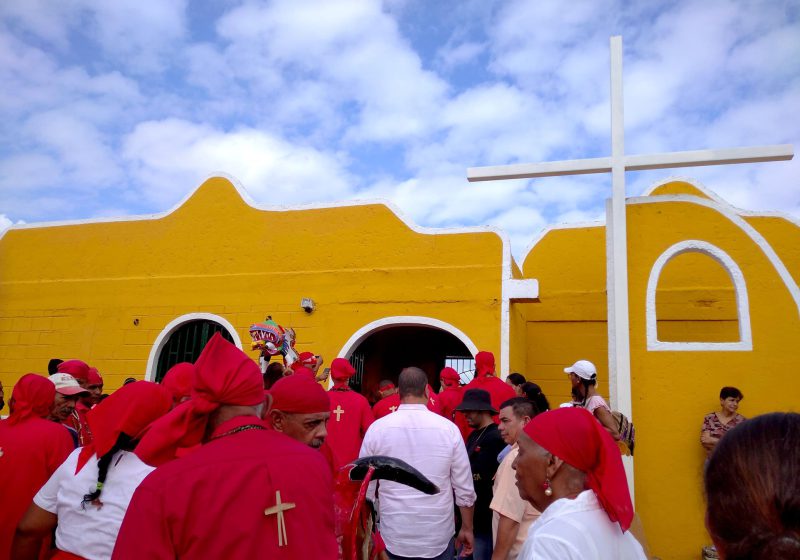
Yare itself is wearing a mask. Individual differences are lost beneath the all-red layers of fabric. Families mingle in the tradition.
Emmanuel’s brother is a promesero, as are his cousin and his grandmother. He is not good at mask making, but his cousin is, and his artisan aunt is too. Together, they design a new one every year.
On the day of the feast, the place fills with tourists, the craft makers take to the streets, and the local food shops work at full capacity; cultural centers feature new art exhibitions; local authorities organize tours of the city’s landmarks, which they vow to keep open beyond the feast, though they never deliver.
When the night falls, the promeseros take off their masks and go dancing and partying. At the break of day, they are still in Yare, minus the tourists, and back to the usual routine.
Back to the same streets and to the same people. But some shops change, and a grocery store is now a gym, a deli meat store is now a greengrocer’s, and a greengrocer’s is now a cyber café, and the local people must go to Caracas for the jobs Yare hasn’t got to offer.
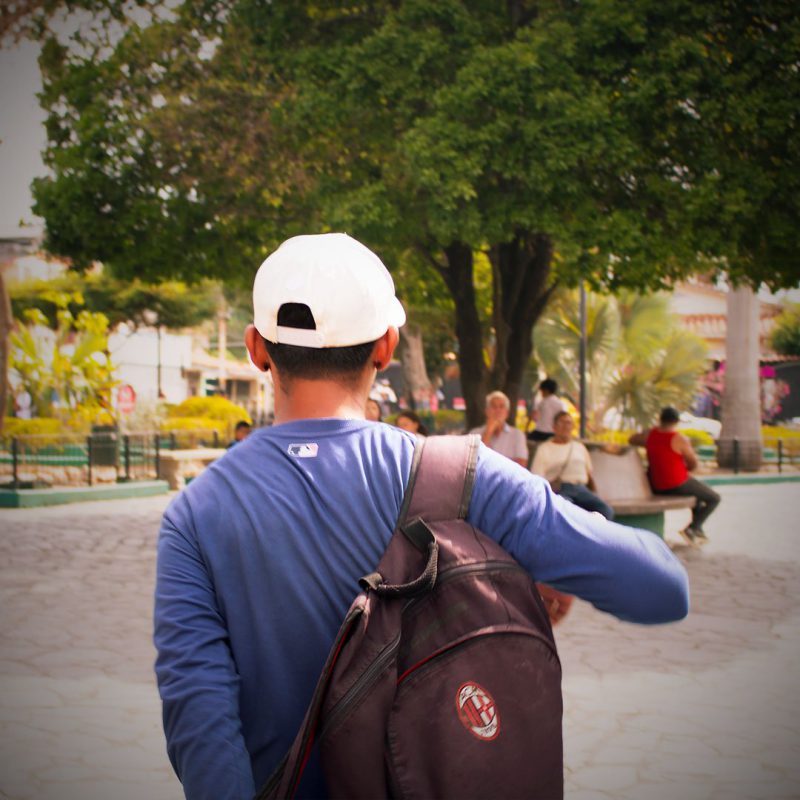
Those are the people to whom Emmanuel sings.
The promeseros perform their ritual before the Blessed Sacrament to show gratitude for a favor received, like passing an exam or landing a job, or seeing the life of a loved one spared or an illness cured.
Misael was born in December of 2015. According to the doctors, the life expectancy of the baby was doomed to be short. And microcephaly can cause motor, cognitive, and developmental issues. It may even be deadly.
But they, as a family, hoped things would turn out better.
One afternoon, Emmanuel was with his mom at his grandma’s. They were sitting around a large table by a window that was exposed to the hot afternoon sun. There were maracas and red masks lining the walls of the house.
No one knew what to say, but they shared the same concern. They looked at each other and gently held each other’s hands. Grandma was the first to suggest it.
—“Why don’t you entrust him to Jesus in the Blessed Sacrament?”
Emmanuel thought of the stories of the many neighbors, relatives, and friends who were honoring their promises for the favors they had received, and gave the matter no further thought: he would dance for Misael and for Misael to live a long and healthy life.
He crossed his hands on the table and said:
—“I live it to you, Our Most Blessed Sacrament. May your will be done. If you take care of my son, I promise I will dance to you my whole life.”
In Yare.
The size of the favor determines the duration of the promise. Emmanuel had already danced as a child to make good a vow his mother had made for him to be cured of a respiratory disease he had at the age of three. Since women are not allowed to dance in the procession, it was Emmanuel who wore red and danced the streets of Yare, giving thanks for his restored health. He did so until he turned eleven.
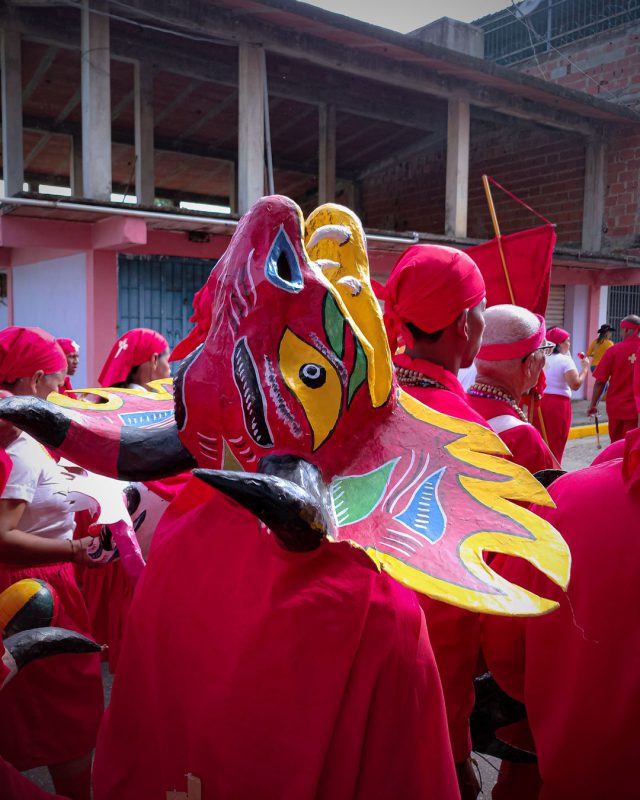
Now he had to put his mask back on.
But, in one of the many twists and turns of life, fate would place a large distance between Emmanuel and his promise.
One morning in 2017, he packed a bag and left. He was nineteen. It had been only a year since he had made the vow to the Blessed Sacrament, but he decided to go to Colombia with his cousin, adding to the list of the more than 900,0000 Venezuelans who left the country between 2015 and 2017.
They arrived in Cúcuta and walked for eight days in the company of a large group of migrants, until they finally made it to Bogotá. That was just the beginning of his journey. He was now in a big city that he didn’t know, with no place to sleep, and with no friend in sight.
Fortunately, Emmanuel has never been one to be overcome by shyness, unlike his cousin, who was a little hesitant at first; so, he started to sell stuff on public transportation units.
In those cold and chaotic days, he found solace and stability in writing and, in his spare time, he would write songs about his experiences. One day, he figured he could start singing in the Transmilenio buses to make some money.
That would be his first formal experience as a bus rapper, with no guidance, all by himself.
He talked to Misael every single day, albeit from a distance. He made good his share of the vow that year, from a distance too: on May 31, 2018, the day of the Feast of Corpus Christi, Emmanuel lit a candle, got down on his knees, and prayed. He heard the drums reverberate on his mind. He felt his body walk the streets of Yare. He thought of his son and his home. He was still for a while, his eyes closed to the candle light, after which he got up and went out to work.
What made him leave Bogotá was the weather. He grew up in a place where the temperature is in the mid-80s degrees Fahrenheit, and he was prepared for many things except for a weather that cold, so he packed his bag and went back home.
An October day in 2018, Emmanuel walked through the door of his grandma’s again.
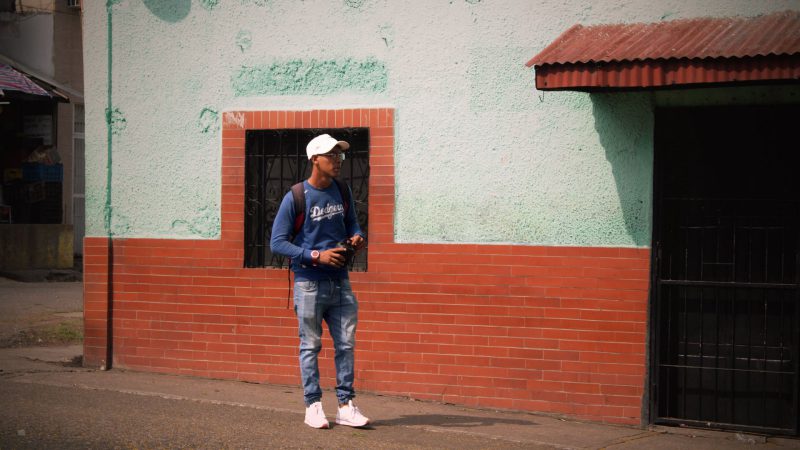
— “Mom, I’m not leaving anymore!”
That was the first thing he said when he saw his mother.
— “Why, son? What happened?” she asked, not knowing whether to smile or knit her brow.
— “I need to rest now, Mom. I’ll tell you later.”
He was back to his homeland, to his son, to his promise.
Misael is now nine and has two siblings.
Emmanuel, for his part, has not stopped dancing, singing, acting, and traveling.
But, wherever he is, wherever he goes, he always comes back to Yare.

This story was written within the framework of the first edition of the Training for Journalists program of La Vida de Nos.
8235 readings